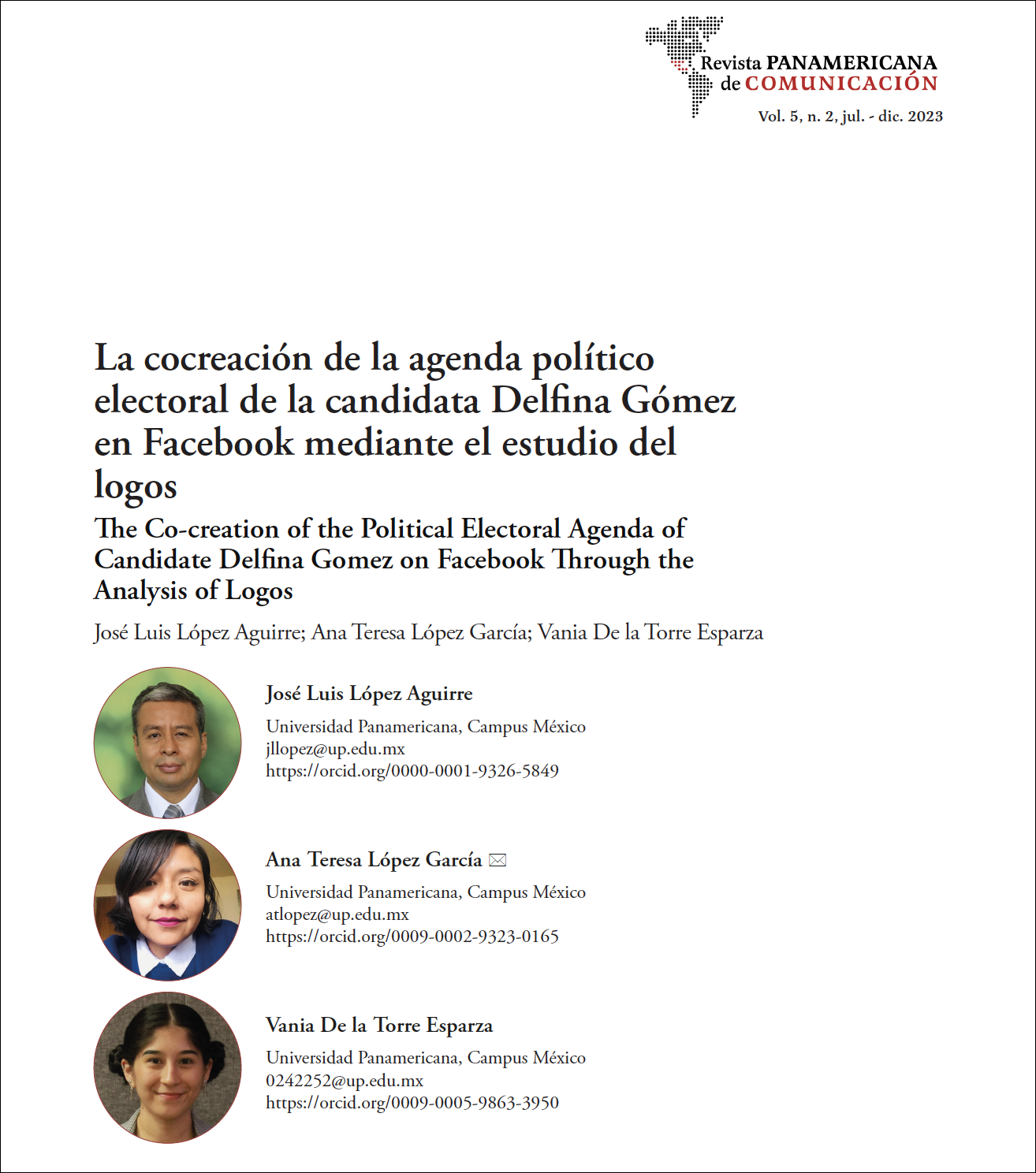The Co-creation of the Political Electoral Agenda of Candidate Delfina Gomez on Facebook Through the Analysis of Logos
Main Article Content
Abstract
In an election campaign disseminated on social and digital networks, the enunciation of certain topics and themes (components of logos) by candidates can provoke empathy among the electorate, influence the formation of the public agenda, and reveal the issues that are of interest not only to the candidate but also to the citizens regarding the problems that the country or entity seeking to govern faces. These assumptions prompted us to investigate which topics and themes were expressed in the posts shared on the social digital network Facebook by the then-candidate and now governor of the State of Mexico, Delfina Gómez, during the electoral campaign that concluded in May 2023. To address this inquiry, we designed and implemented a methodological strategy that allowed us to identify the elements of logos that particularly sparked interest among Facebook users and, consequently, discover how the electoral political agenda was constructed on this social digital network.
Article Details
References
Angenot, M. (1982). Presupuesto, Tópico, Ideologema. En La parole pamphlétaire. Paris, Francia: Payot.
Anscombre, J. & Ducrot, O. (1994). La argumentación en la lengua. Madrid, España: Gredos.
Barthes, R. (1993). La retórica antigua. En La aventura semiológica. Barcelona, España: Paidós.
Castells, M. (1999). La era de la información: economía, sociedad y cultura. Vol I. México: Siglo XXI.
Castells, M. (2013). Comunicación y poder. Siglo XXI.
Christakis, N. & Fowler, J. (2010). Conectados. México: Taurus.
Golbeck, J. (2015). Introduction to social media investigation: A hands-on approach. EU: Elsevier.
Gómez, B., y López Aguirre, J. L. (coord.) (2019). Agenda sociodigital de la campaña presidencial de 2018. Temas, emociones y notas falsas que motivaron la interacción político-ciudadana. 1a ed. Torreón, Coahuila. Universidad Autónoma de Coahuila
Kaiser, B. (2019). La dictadura de los datos. HarperCollins Publishers.
López Aguirre, J. L., Gómez Aguilera, B. N., Cerón Hernández, C., & Fernández Fernández, E. (2021). La retórica digital del discurso político electoral en Twitter: análisis del logos, ethos y pathos. Aportaciones de la ciencia de datos en el estudio de temas y sentimientos. Universidad Panamericana.
López Aguirre, J. L. y Betancourt, S. (2017). Mexican elections travel to social media: how citizens participated through YouTube, Facebook and Facebook. En G. Richardson (Editor), Social media and politics: A new way to participate in the political process. Vol. I. Estados Unidos: Praeger.
Maingueneau, D. (2009). Análisis de textos de comunicación. Buenos Aires, Argentina: Ed. Nueva Visión.
Manjoo, F. (2016). El poder de las redes sociales para sacudir al mundo. New York Times en español. https://www.nytimes.com/es/2016/11/24/el-poder-de-las-redes-sociales-para-sacudir-al-mundo
Meyer, M. (2009). Principia Rhetorica. Une théorie générale de l´argumentation. Paris, Francia: Fayard.
Ortiz, M. & López Aguirre, J.L. (2017). La agenda ciudadana se configura en la nube. En La observación de medios. Algunos referentes teóricos. México. Consejo Nacional para la Enseñanza e Investigación de las Ciencias de la Comunicación.
Perelman, Ch. & Olbrechts Tyteca (1989) Tratado de la argumentación. La nueva retórica. Madrid, España: Gredos.
Plantin, C. (2009). Significar la propia emoción (e “irse sin pagar”). En: Revista Páginas de guarda. Buenos Aires, Argentina: ed. del Calderón.
Rost, A. (2006). La interactividad en el periódico digital [Tesis de doctorado]. Barcelona, España: Universidad Autónoma de Barcelona.
Sánchez Botero, C. Helena., Serrano, G., & Peña, J. I. (2009). Argumentación y lógica: herramientas para un análisis crítico de argumentos. Editorial Universidad Nacional de Colombia.
Scolari, C. (2008). Hipermediaciones: elementos para una teoría de la comunicación digital interactiva. Barcelona, España: Editorial Gedisa.


